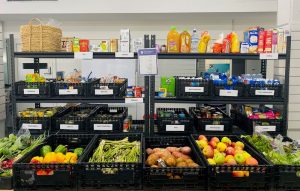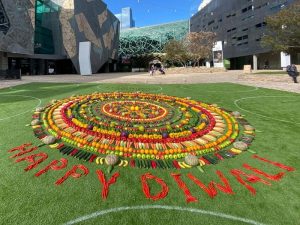Thanks to all the people who have contributed to this week’s newsletter: Anita Merson, Helen Collier, Kate Shannon, Louise Nolan, Megan Goodman, Mia D’Abaco, Natalie Nigol, Stuart Rodda and Virginia Solomon.
News about re-openings
Here is my sense about broadly where we are and what is happening:
- Farmers’ markets: most either stayed open or are now re-opening. For example, Yarra Valley Farmers’ Market will re-start this coming Sunday (at a new venue – see below).
- Other markets: a mixed bag, with some now having re-opening dates (e.g. Warrandyte), some having re-opened but temporarily as food markets only (e.g. Kingsbury), and others remaining closed for the time being.
- Community Gardens: a few are re-opening (for members only), but most haven’t yet announced re-opening plans.
- Food Swaps: as with community gardens, whilst a few are re-opening, most haven’t yet announced re-opening plans.
- Events: just about all upcoming workshops and other once-off events are still going to be taking place online rather than face-to-face.
What farmers’ markets will be happening this weekend?
On Saturday: Collingwood (relocated to Alphington) and Coburg.
On Sunday: Alphington, Eltham and Yarra Valley.
Yes, that’s right, The Yarra Valley Regional Food Group Farmers’ Market has re-opened! And it has moved to a new venue: Punt Road Winery, 10 St Huberts Road, Coldstream. And the time is now 9am to 1.30pm.
The BANSIC Food Hub
 One of the most notable aspects of North East Melbourne is the number and vibrancy of the local food justice organisations. One such is the BANSIC Food Hub. The BANSIC Food Hub provides food assistance to residents of southern Banyule who are struggling with food security. Clients are provided with a range of groceries, such as fresh produce, eggs, meat, pantry items and bread, all free of charge. The hub is open from midday to 3pm on Mondays, Wednesdays and Fridays. Members of the Banyule community who are in a financial crisis can access their service by ringing them on 9459 5959 to request a food parcel. The food parcels can be accessed generally every 2 weeks for eligible clients.
One of the most notable aspects of North East Melbourne is the number and vibrancy of the local food justice organisations. One such is the BANSIC Food Hub. The BANSIC Food Hub provides food assistance to residents of southern Banyule who are struggling with food security. Clients are provided with a range of groceries, such as fresh produce, eggs, meat, pantry items and bread, all free of charge. The hub is open from midday to 3pm on Mondays, Wednesdays and Fridays. Members of the Banyule community who are in a financial crisis can access their service by ringing them on 9459 5959 to request a food parcel. The food parcels can be accessed generally every 2 weeks for eligible clients.
The hub’s supporters include SecondBite, Foodbank, Aldi, Woolworths and Sustainable MacLeod. SecondBite, Foodbank and Aldi donate non-perishable pantry items, fresh fruit and vegetables. Woolworths in Heidelberg donate eggs. Sustainable Macleod donates locally grown vegetables.
Read the BANSIC Food Hub’s page in the food justice section of our Local Food Directory. Welcome Mia, Kate and colleagues!
Cafes who give away spent coffee grounds
I have just become aware of the Darebin ‘cafe to garden’ program, as a result of which I have added some more cafes to our list of cafes who give away spent coffee grounds to people who want to use them in their garden. There are now 24 cafes on the list.
Newsletter reader growing tip: synthetic gardening gloves
This tip is from Stuart Rodda.
Which garden gloves make life better? In my [Stuart’s] view, gloves are a ‘must’ most of the time but different gloves suit different tasks.
Rubber gloves are waterproof and vary from too thin/tearable to ‘tough’ but lacking feel. Unless flock lined, they can be hard to put on/take off. They also make your hands sweaty and need frequent washing inside to eliminate odours. They are mainly useful where you are working with water or wet soil.
Cotton gloves soak up any moisture and get damaged, dirty and worn out quickly, and don’t protect against thorns etc. Cotton gloves coated with a waterproof layer over the palms or fingers are a nice hybrid but also have some of the same drawbacks, and the coating doesn’t last all that long.
 I recently bought coated synthetic gloves at Kmart (see photo) and I find they fulfil nearly all the best features and have few drawbacks. The woven synthetic base material is tough, comfortable, breathable, retains its shape and makes the gloves easy to slide on and off. The coating is rugged, grippy, and comes far enough up your hand to allow you to wash dirt off the outside of the gloves without getting the woven part wet. After some months of constant use, there is little sign of wear, and the whole glove can be washed and dried quickly if need be. They are also cheap (2 pair for $6). They do have a ‘vinegar’ smell to them when new which fades, and I think that this indicates the coating is silicone rubber, a thin but durable material. They are available in both Large and Medium size.
I recently bought coated synthetic gloves at Kmart (see photo) and I find they fulfil nearly all the best features and have few drawbacks. The woven synthetic base material is tough, comfortable, breathable, retains its shape and makes the gloves easy to slide on and off. The coating is rugged, grippy, and comes far enough up your hand to allow you to wash dirt off the outside of the gloves without getting the woven part wet. After some months of constant use, there is little sign of wear, and the whole glove can be washed and dried quickly if need be. They are also cheap (2 pair for $6). They do have a ‘vinegar’ smell to them when new which fades, and I think that this indicates the coating is silicone rubber, a thin but durable material. They are available in both Large and Medium size.
I can now use one pair of gloves for almost every job instead of having several different types ‘on hand’ (LOL) and making frequent changes. If I need bare hands, e.g. for handling seeds, the gloves slip off and on easily without turning them inside out. No more scratches, cuts or dirt stuck under fingernails!
Read more newsletter readers’ tips.
Do you know?
Plums falling off
Many of Anita Merson’s plums (that are green just now and about 1-2cm big) are falling off her tree. The tree has a lot of fruit and it is not all the fruit that is falling off; rather, it is just the smaller ones. Is this just natural fruit thinning or is it a problem? If the latter, what might be the cause and how can it be avoided in future? Email me with your answers
Whitefly and thrip infestation
Louise Nolan: “How can I get rid my garden of both whitefly and thrips? I’ve never had such huge numbers before, plague proportions on nearly every single plant in my garden. I have no idea why this has occurred. I don’t spray with any non-organic products but I do use Eco bio oil and Eco Neem.” Email me with your answers
Some guidance on ‘pest animals’
A few months ago, we discussed Nillumbik Council’s guidance on what it calls ‘pest animals’. That guidance has now been updated to include noisy miners in a new section called ‘swooping birds’.
Every newsletter needs a good picture
 Diwali, or the Indian festival of lights, is an annual festival to celebrate ““victory of light over darkness, good over evil, and knowledge over ignorance“. This year’s Victorian festival has just finished and was online. To celebrate, a rangoli made out of fruit and vegetables was constructed in Fed Square (see photo). All the food was subsequently donated to Foodbank Victoria.
Diwali, or the Indian festival of lights, is an annual festival to celebrate ““victory of light over darkness, good over evil, and knowledge over ignorance“. This year’s Victorian festival has just finished and was online. To celebrate, a rangoli made out of fruit and vegetables was constructed in Fed Square (see photo). All the food was subsequently donated to Foodbank Victoria.
Meg’s ‘not quite so socially isolated’ week
As we slowly return to school and external activities, I have less time to spend in the garden. It does not seem to matter, however, as the garden seems to want to grow and thrive without my attention in the warmer weather and spring rains. The broad bean recipes from a month ago in the newsletter are coming in handy – once they start producing, the broad beans seem to grow overnight. I also have a fresh crop of loose leaf lettuce.
This week I have started to net the fruit trees. I don’t do the larger trees such as the blood plums as there is usually enough to share. However, for the coveted cherries, peaches and apricots, I use small gauge white netting stretched tightly for wildlife. I was pleased to see that this type of netting will become mandatory. Netting is a family job involving ladders and upside down brooms and rakes to pull the netting over the tops of the trees. It is hard work and deserves to be rewarded with the first of the early strawberries and a large piece of lemon slice.
Traditional lemon slice
The biscuit base
250g of plain biscuits (such as Arnott’s Marie), crushed
100g butter
½ cup condensed milk
1 cup desiccated coconut
1 teaspoon lemon rind, finely grated
Melt the butter and condensed milk together in a small saucepan and then pour over the crushed biscuits, coconut and lemon rind (I normally reserve some of the wet ingredients until I see how sticky the mix is, adding extra coconut if too sticky). Mix well and press firmly into a slice tin. Refrigerate to set.
The lemon icing
1 cup icing sugar
1 teaspoon soft butter
lemon juice
extra desiccated coconut
Add the lemon juice to the icing sugar and butter a little at a time until you reach a spreadable consistency. Spread over the biscuit base.
Sprinkle with coconut and return to refrigerator to set before slicing into squares.
Which link was clicked most times in the last newsletter?
The most popular link was Robin’s article on growing tomatoes.
Joke (or pun) of the week
Bakers trade bread recipes on a knead-to-know basis.
Upcoming online events
If you know of any events other than those listed below, email me.
Newly announced events
Creating a pollinator friendly garden: Saturday, 14th November, 10.30-11.30am; free; organised by Darebin Council. Read more and book on Humanitix.
Learn to make gemista (presented in Greek): Tuesday, 17th November, 7-8pm; free; organised by Darebin Libraries. Read more and book on EventBrite.
Whittlesea Community Farm – community sharing session: Thursday, 19th November, 6-7pm; free; organised by Whittlesea Community Farm. Read more and book on EventBrite.
Sourdough bread making: Saturday, 28th November, 11am-midday; $20; organised by Living & Learning Nillumbik. Read more and book on their website.
Sustainable home & kitchen: Saturday, 28th November, 2-3pm; free; organised by Central Ringwood Community Centre. Read more and book on Facebook.
Sourdough bread making: Sunday, 29th November, 3-4pm; $20; organised by Living & Learning Nillumbik. Read more and book on their website.
Closing the food loop: Tuesday, 1st December, 7-8pm; $12; organised by Reground. Read more and book on EventBrite.
Expanding the food loop: Tuesday, 8th December, 7-8pm; $12; organised by Reground. Read more and book on EventBrite.
Previously announced events
Modern bush tucker: Thursday, 12th November, 7-8pm; free; organised by Moreland City Libraries. Read more and book on EventBrite.
Preparing for Summer harvest: Thursday, 12th November, 7-8.30pm; free; organised by Sustainable Gardening Australia. Read more and book on WeTeachMe.
Daal makhani and naan bread: Friday, 13th November, 5.30-7pm; $39; organised by Cook Indian by the Creek. Read more and book via Facebook.
Growing citrus: Saturday, 14th November, 11am-12.30pm; $28; organised by Sustainable Gardening Australia. Read more and book on WeTeachMe.
Incredible Edible Eltham summer planting: Sunday, 15th November at 2pm. Organised by Incredible Edible Eltham. Register to participate by email.
Samosa and chutney: Sunday, 22nd November, 4.30-6pm; $29; organised by Cook Indian by the Creek. Read more and book via Facebook.
The art of watering: Sunday, 22nd November, 1.30-3pm; $28; organised by Sustainable Gardening Australia. Read more and book on WeTeachMe.
Bees wax wrap: Wednesday, 11th November, 6.30-7.30pm; free; organised by Whittlesea Council. Read more and book on their website.
Home harvest workshop: Wednesday, 9th December, 7-8.30pm; free; organised by Whitehorse Council. Read more and book on EventBrite.
Open Table offer their weekly no waste cook club workshops free and online on Saturdays, 11.30am-1pm. As well as cooking (which is actually optional), you will learn about food waste and composting. Register on EventBrite.
All The Dirt is a weekly podcast about gardening.
